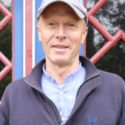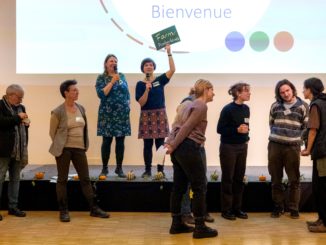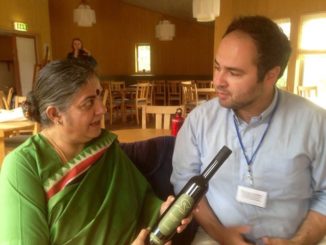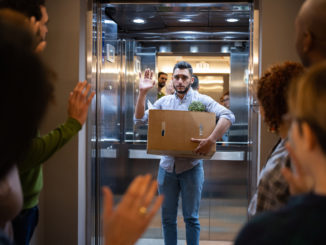

Investing in a small family farm is much more than an economic consideration: it can help to revitalise an entire village. Rural communities are rooted in multi-generational family farms. In the Greek village of Trikorfo (Τρίκορφο), father and son Vasilis and Lukas Mylonas are two generations of olive farmers who are honouring their roots while looking to the future for their community. Hannes Lorenzen reports from his visit to the farm in May.
Greek mythology is still alive in Τρίκορφο. Vasilis Mylonas, born in the village as the fifth of eight children of a small farmer couple, can make Hercules and Zeus appear alive while walking me proudly through the olive groves of his long established family in the mountains of Nafpaktos at Patras Bay in the West of Greece.
“It was precisely here that Hercules had to work off the famous 12 labours to be finally allowed to join Zeus at the Olympus!” he explains. “And I can imagine that my parents who were poor, but very brave, raising eight children in these difficult farming and climate conditions, must have sometimes felt like having to sustain similar ordeals as Hercules did. I am thankful for what they did for us, and I feel like giving something back to my family and to my village which both generously offered to me.”

Vasilis came back to the village ten years ago, after retiring as a civil servant of the European Parliament in Brussels. He then started a small rural tourism enterprise close to the house which he had built earlier for family holidays. It was the first tourism initiative in his village. He also invested into processing and marketing facilities to value his family’s olive groves, including his brother, cousins, and neighbours in the undertaking.
“It was important to take the step into organic certification,” Vasilis explains. “Almost all olive oil production here is done without applying any chemicals, but when you sell, the price without certification is not paying for the work we do. The beauty of our groves, the landscape we adore, and the people keeping it alive, all deserve a fair pay.”

To be part of a long tradition
Lukas, Vasilis’ eldest son, is with us admiring the flowering olive trees. “Last year we harvested much less than usual,” he nods. “But it seems that this year we might have a very good crop. It will be quite a job to get it all in.”
Lukas helps every year at harvest time which is usually in October and November, taking holidays for that purpose. He was brought up in Brussels, studied in Patras, Amsterdam, Antwerp and Gotland, and holds master’s degrees in ecology, climate, and renewable energy management. He now works as planner for wind, solar and hydrogen projects at ABO Energy enterprise in Mainz, Germany.
“Harvesting olives at home is hands-on fun with cousins, uncles and family,” Lukas smiles. “It is something like coming down to earth and being at home, not just for good food and talk, going to the beach and the mountains – that is all great – but to be part of a long tradition of producing good olive oil from our very old trees. Some are perhaps more than a thousand years old. They are beautiful, and they tell a story, and they are a lifeline, just as my cousins Kostas and Andreas and the whole family are.”

Keeping the entire village together
“If you look at what we do, only from an economic perspective, you might conclude that we dream a dream of the past,” Vasilis comments. “Two or three thousand litres of olive oil marketed per year are not a basis for living. But I see it from another side: we all look into an unsure future. We do not only want to preserve life in our village, but we also want to create various opportunities to combine income from outside the village with some kind of subsistence lifestyle here in Trikofor. So, our engagement is not only about preserving the heritage of housing or developing rural tourism, even if we can offer beaches at the nearby sea and trekking opportunities in the mountains. It is about keeping the entire village together, the olive groves, the sheep and goats, the local shops, restaurants, and the bakery. All are linked to each other and need each other.”
Lukas has recently taken over the ownership of the tourism and olive oil enterprise from his parents. He can work with his father and mother online from his home in Germany. He helps with digitalisation of the management, while Vasilis and his wife Annette concentrate on marketing, logistics and visits of clients and exhibitions.
“What is really annoying running a small enterprise like ours is the bureaucracy we have to deal with all the time,” says Lukas. “Digitalisation is not the only remedy against it. Since the financial crisis with many austerity measures imposed, the government has outsourced financial control to private banks. And banks are not keen on working with small enterprises. They torture us with stupid administration which is useless and they hope that we give up,” Lukas sighs.

“The village is my lifeline”
“Our local economy is mainly subsistence. People have their gardens, sheep, goats, olive oil and only sell what they do not consume at home. The only product which is bringing money is sheep and goat milk for feta cheese. We have tried to create small dairy facilities. But the bigger milk processors did everything to stop us. They control the milk market and do not want competitors. But we must do something so that sheep and goats stay. They are part of the equation for our economy,” comments Vasilis.
“If I should say how I see my future in Trikofor it will be a try to find a good balance between my professional job in planning and hand-on experience at home,” says Lukas. “Management is the skill I have for the job and family and friends are the roots I appreciate. How it will work out, I cannot foresee, but without trying to find the balance between the two I cannot find out whether it works. The village is my lifeline to my father’s family, to my mother, brother and my sister who are here during summer. And that is a good place to be.”
More letters from the farm
Letter From The Farm | A Flamenco Approach to Rural Resilience
Letter From The Farm | Cooking With The Lights Off – Ingredients of Rural Resilience
Letter From The Farm | Rural Digitalisation Remains a Hard Sell
Farm to Forms – the Epicness of Trying to Establish and Run a Farm in France





